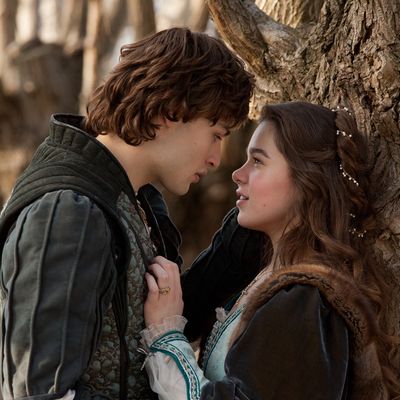
Modernizing Shakespeare has become so endemic in recent years that the Medieval knights who come charging out of the gates in the opening shots of the new Romeo and Juliet have an aura of brazenness about them. This version, they seem to promise us, as director Carlo Carlei’s camera races around them, will be fearlessly, defiantly traditional. In other words, when a character yells, “Put up your sword” this time around, he won’t be pulling out a gun. Madness!
Still, there’s only so much the new film can do, and we know all the key beats already: “In fair Verona, where we lay our scene,” Montague hunk Romeo (Douglas Booth) crashes a costume ball thrown by his family’s mortal rivals the Capulets and falls for their prize beauty, Juliet (Hailee Steinfeld). One fateful balcony encounter later, the two swoon for each other and, unbeknownst to their families, get married. But the bad blood follows them, and Juliet has been promised to another. Wackiness ensues, the bodies pile up, thus does heaven find means to kill our joys with love. I won’t spoil the ending for you, but they both die.
And yet, for all the gimmickry over the years, any Romeo and Juliet lives or dies by the effectiveness of the leads. (Note that I don’t say “chemistry.” Did the men and boys who played the leads in the Bard’s day have “chemistry”? Who knows?) Baz Luhrmann’s infamous 1996 adaptation was structurally silly, but it so effectively captured and distilled the charisma of the young Leonardo DiCaprio that I half-think Luhrmann should get some credit for the success of Titanic as well.
Adapted by Downton Abbey scribe Julian Fellowes, who took some notable liberties with the dialogue, the film isn’t so lucky when it comes to performers. Booth is likable, but stiff, and the most legendarily star-crossed lover of all time needs a bit more than a nice face. Steinfeld, so heartbreakingly tense and driven in the Coen Brothers’ True Grit, fares a bit better, at least initially. In fact, she convinced me at first that her Juliet could be something special. She speaks the infamous lines “Wherefore art thou Romeo?” less like a timeless proclamation of love and more like a wistful sigh into the night. It works: The innocence, the charmed, plangent frivolity of this love is easier to believe, and perhaps even more compelling, than the mythic, earth-shaking version. But it doesn’t scale, and as the story proceeds into darker, more desperate territory, this lovely young actress’s performance can’t quite keep up: She speaks the lines faster and faster, and they start to mean less and less. Juliet should be a girl, but the story’s trajectory of self-sacrifice requires her to become a woman. Steinfeld gets the girl part exactly right, but she botches the transformation. Or rather, the movie botches it, because there’s a stylistic disconnect here, too. The lush, galloping score (by Abel Korzeniowski), while beautiful, doesn’t do her any favors.
There’s also the common Shakespearean dilemma (onscreen or onstage) of Snarly Actor Syndrome — the need some performers feel to over-emote in an effort to make the Bard’s language accessible to modern audiences. It’s not enough, in other words, for Lord Capulet (Homeland’s Damian Lewis) to yell, “Out, you green-sickness carrion!” to his daughter; no, he has to leap on her bed and spit venom at her through gritted teeth, so as to make sure we get the point. Some actors can go this broad: Olivier was the master, and a couple of years ago Ralph Fiennes did a fine job spitting and snarling and screaming in his adaptation of Coriolanus. But the performers here — be it Lewis or Ed Westwick (a.k.a. Chuck Bass from Gossip Girl), who plays Juliet’s seething cousin Tybalt — become less convincing the louder they get.
Still, the film is not without its pleasures. Director Carlei, who made an excellent film called The Flight of the Innocent two decades ago, has a fluid visual style that keeps things moving at a nice clip. Paul Giamatti shows up as Friar Laurence, and he’s the best thing in the film: Funny and vibrant, despite the fact that he has to carry the weight of so much intricate plot exposition. Plus, there are Verona- and Mantua-specific locations that may very well be the real things: One notable scene near the end has Romeo hiding out in what appears to be the real Palazzo Te in Mantua, featuring Giulio Romano’s insane, perspective-shifting fresco The Fall of the Giants. Last but not least, among their many changes, Carlei and Fellowes add one near-magnificent touch to Romeo and Juliet’s final scene together, in which the two lovers briefly glimpse each other before one wakes and the other dies. Not in the original text, it’s a remarkable, nearly wordless moment, and suggests that somewhere in this awkward, uneven adaptation, an inspired heart may still beat.


